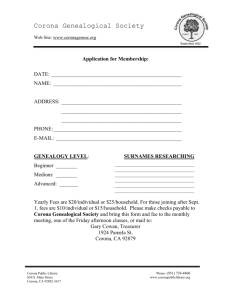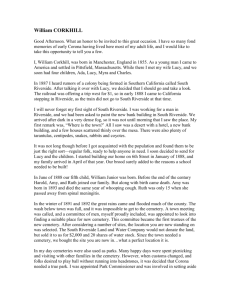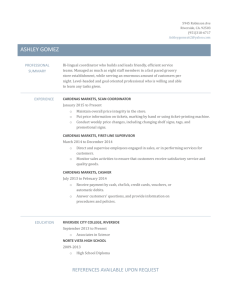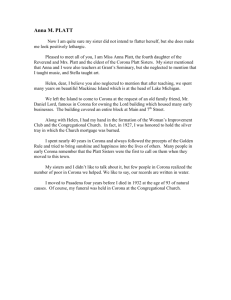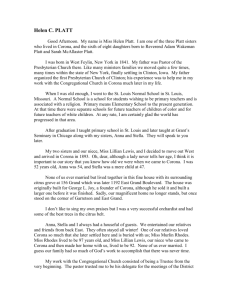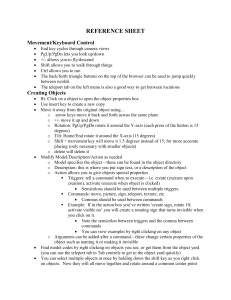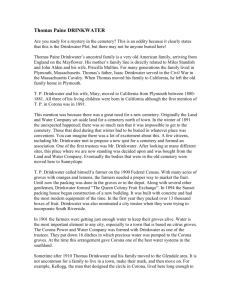Well, well, you have the pleasure of standing in front of the
advertisement
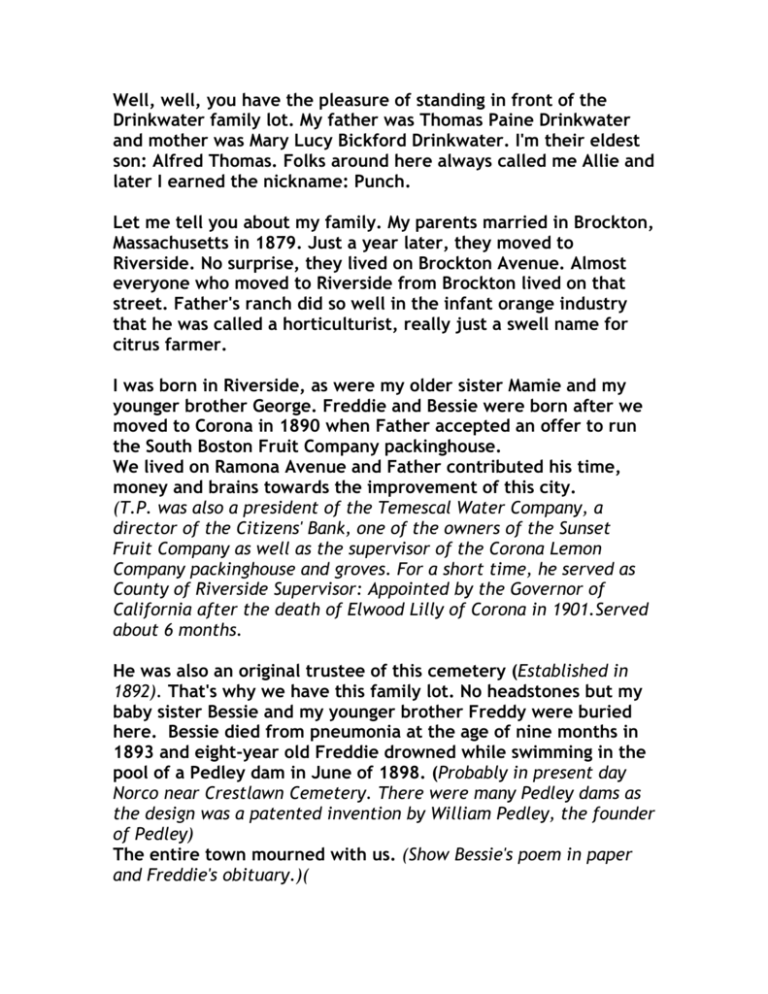
Well, well, you have the pleasure of standing in front of the Drinkwater family lot. My father was Thomas Paine Drinkwater and mother was Mary Lucy Bickford Drinkwater. I'm their eldest son: Alfred Thomas. Folks around here always called me Allie and later I earned the nickname: Punch. Let me tell you about my family. My parents married in Brockton, Massachusetts in 1879. Just a year later, they moved to Riverside. No surprise, they lived on Brockton Avenue. Almost everyone who moved to Riverside from Brockton lived on that street. Father's ranch did so well in the infant orange industry that he was called a horticulturist, really just a swell name for citrus farmer. I was born in Riverside, as were my older sister Mamie and my younger brother George. Freddie and Bessie were born after we moved to Corona in 1890 when Father accepted an offer to run the South Boston Fruit Company packinghouse. We lived on Ramona Avenue and Father contributed his time, money and brains towards the improvement of this city. (T.P. was also a president of the Temescal Water Company, a director of the Citizens' Bank, one of the owners of the Sunset Fruit Company as well as the supervisor of the Corona Lemon Company packinghouse and groves. For a short time, he served as County of Riverside Supervisor: Appointed by the Governor of California after the death of Elwood Lilly of Corona in 1901.Served about 6 months. He was also an original trustee of this cemetery (Established in 1892). That's why we have this family lot. No headstones but my baby sister Bessie and my younger brother Freddy were buried here. Bessie died from pneumonia at the age of nine months in 1893 and eight-year old Freddie drowned while swimming in the pool of a Pedley dam in June of 1898. (Probably in present day Norco near Crestlawn Cemetery. There were many Pedley dams as the design was a patented invention by William Pedley, the founder of Pedley) The entire town mourned with us. (Show Bessie's poem in paper and Freddie's obituary.)( Father wasn’t afraid to speak his mind and his children knew he would be there for us. When I was a teenager; Corona enacted a curfew for minors. (in 1899) I was held up to public scorn for purchasing a haircut at an unseemly hour when all good kids should be in bed. Father paid the fine but blasted the goo-goo government law in the Riverside paper and threatened to carry the matter to the Superior Court. (goo-goo is slang for too much government control and term was used in this article) (This happened in 1907 George was about nineteen years old but probably a high school senior.(He graduated in 1908) Father was there for my brother George, as well. Cigar and confectionary storeowner, Frank Johnson said George didn’t pay for a dime's worth of ice. He stabbed George above his left eye with a pair of ice tongs. Johnson was arrested on assault and Father threatened to carry this matter to the Supreme Court. In 1896, Father bought me a bike and from then on; I was rarely home. I participated in the local bicycle races; we'd race out to the old Rincon cemetery or around Grand Boulevard. I was fifteen (1899) when I rode my bike to Riverside with the Craig brothers and stayed away for over two weeks. The Craig sissies went home after two days. Father ran an ad about my disappearance in the Riverside Enterprise, someone ratted me out and Father brought his prodigal home. Bet you're wondering what I have to do with local schools? Not much, (slight chuckle) I didn’t even graduate, I was too busy earning my nickname. Mamie and George loved school. Mamie belonged to all clubs and played piano at social events. George was on the debate team and acted in school plays. Mamie graduated from high school in 1901 and was accepted at Stanford. She taught music and later became a Los Angeles court stenographer. Mamie never married and lived with our parents' until they passed away in their eighties. George graduated from Corona schools in 1908. He served in WWI with the Coast Artillery and worked as a Los Angeles streetcar conductor (first for the Pacific Electric line). Man, I would have been bored out of my mind but George did the same job until he retired. Oh, still wondering about my connection with local schools? Here's the scoop: It was a Sunday in April of 1903. I was eighteen, when my pal William Kepler and I were accused of maliciously damaging the Rugby Schoolhouse in Temescal. The schoolhouse windows, door, blackboards, organ and other furniture were in pieces, destroyed by gunfire. Rugby School Trustee Thomas E. Parks, (sarcastic tone) better known as the local beekeeper, wanted to see justice done and signed a complaint for our arrest. He'd received a tip that we'd been in the area, intoxicated, and had been seen shooting at the old winery earlier the same day. Matching caliber and casings of the bullets we had used at the winery were found at the school. BUT since there no eyewitness accounts; the Justice had to let us go even though he admitted to all parties that he believed we were guilty. Trustee Parks was livid; especially after the Riverside newspaper ran an editorial making light of the incident with a "boys will be boys" attitude. Parks ran a rebuttal in the Corona Courier offering a $50 reward for evidence leading to our conviction and telling the writer of the editorial, "that he had better get off this earth if he was in the habit of making light of crimes against our public institutions." (Smile and shrug) As I had always enjoyed doodling, Father notified his contact at the Riverside Enterprise (newspaper) that I would be attending the Throop Institute in Pasadena to become an architect. (Throop became Cal Tech) Instead, my wandering spirit took me to Pima, Arizona where I met and married Miss Lucy Turner. (1906) As a married man, I came back to Corona in 1909. My parents wished to move to Glendale to open a real estate office and I was to oversee the family interests here. Unfortunately, Corona had become a dry town on September 1,1901; nineteen years before it became the national law in 1920. By 1911, I had been arrested for bootlegging. I hadn’t even made it out of the recorder's office after paying the $100 fine when I was arrested again for selling hooch to minors. I beat it before my court date with your husband; Judge Clayson. (gesture to docent. She is portraying Judge Clayson's wife) (shake head) Corona was no good anymore since the lid was closed down. I found another locality less particular about the conduct of its citizens. (This is Punch's quote from newspaper) We moved to San Diego, where I worked on and off as a mechanic, window washer and house painter as well as, well, carrying on my other enterprise. Lucy worked for a laundry service until we divorced. While living alone in San Diego, I was arrested for disturbing the peace. My one-room house burned as I waited in jail for Father to come from Glendale to bail me out. Not my fault, I distinctly remember telling the arresting officer; I'd left a lit ciggy on the table. (1922) It's none of your beeswax what I was doing in Portland, Oregon in February of '28: (before prohibition ended). But, at the age of forty-four, I was struck by a car and found by the side of the icy road with Freeman Vanderhoff's billfold in my pocket. Mr. Vanderhoff was reported dead in the Oregonian. (Shrug with smile) Vanderhoff soon informed the police that he was enjoying excellent health but had recently lost his billfold. From grocery slips in my coat, the Portland police were able to determine my name and tracked down Father to retrieve me for the last time. (Turn away from crowd) End

